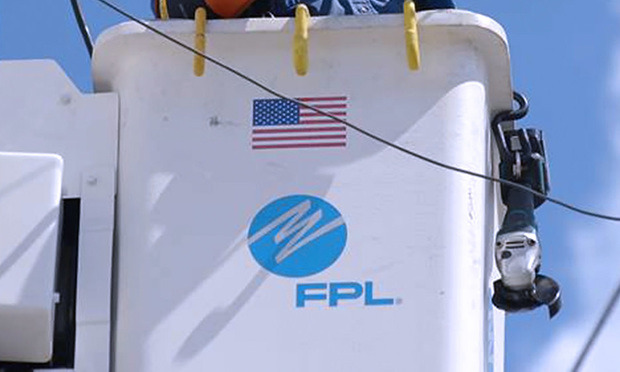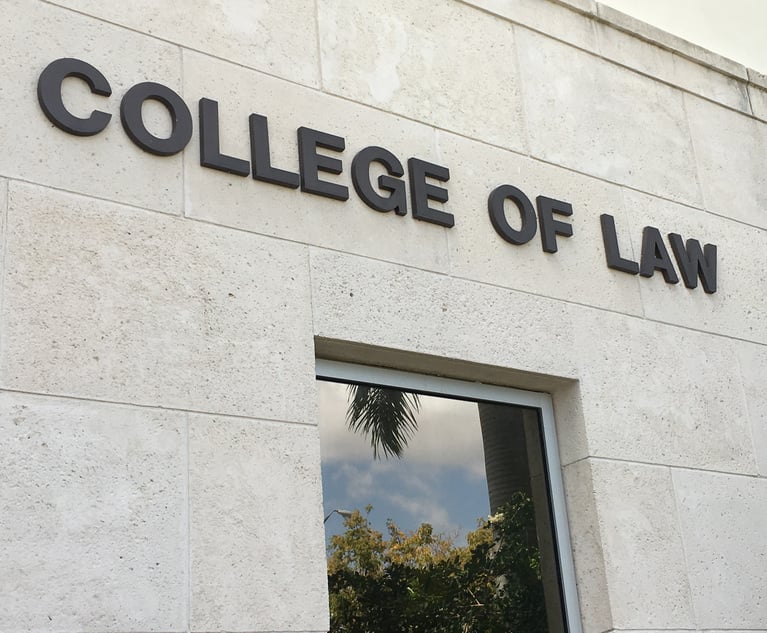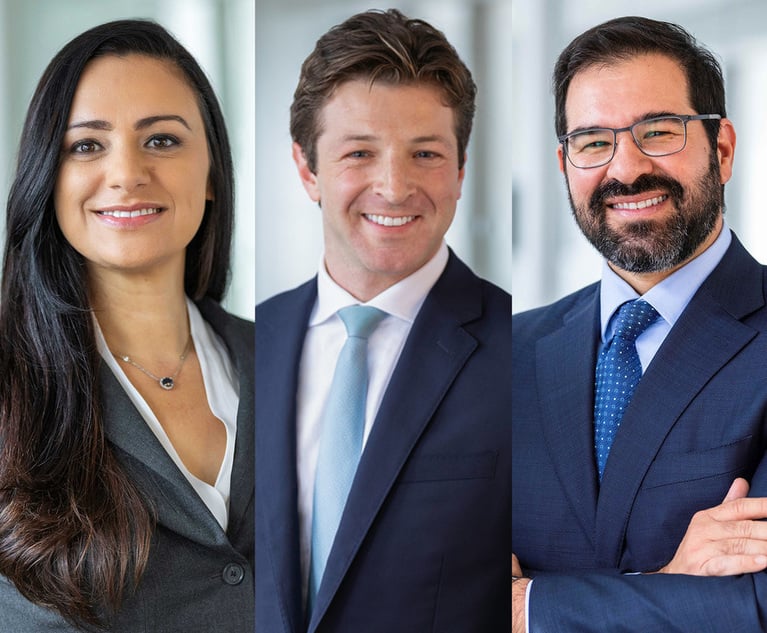Florida Utility Fires Back at 'Specious' Dispute Over Refund, Rates
The state Office of Public Counsel, which represents utility customers, and two business groups filed a petition focusing, in part, on FPL's tax savings under the federal tax overhaul approved last year.
December 27, 2018 at 11:55 AM
4 minute read
 Florida Power & Light/courtesy photo
Florida Power & Light/courtesy photo
Describing the case as “specious, legally and factually baseless,” Florida Power & Light has asked state regulators to reject a petition that seeks to force the utility to refund as much as $736 million to customers and reduce base electric rates.
The state Office of Public Counsel, which represents utility customers, and two business groups filed the petition Dec. 5, focusing, in part, on FPL's tax savings under the federal tax overhaul approved last year. But FPL on Friday filed a 22-page response that disputed the arguments and urged the Florida Public Service Commission to deny the petition.
FPL said it has complied with a 2016 rate settlement that was signed by the OPC and one of the business groups filing the petition, the Florida Retail Federation. Along with the tax savings, the dispute involves a complex mix of issues, including Hurricane Irma restoration costs and a profit limit and a financial reserve that are parts of the 2016 settlement.
“Petitioners advocate an interpretation of the settlement agreement for which there is simply nothing that comes close to exhibiting a good faith basis,” FPL's response said. “It lacks textual support and in some cases is directly contravened by the express terms of the settlement agreement.”
But in the petition, the OPC, the FRF and the Florida Industrial Power Users Group contended that the utility is seeing as much as $736.8 million a year in tax savings from the federal tax overhaul and that the savings should be passed along to customers.
“Contrary to the 2016 stipulation and settlement between FPL, OPC, and the FRF, contrary to the 'regulatory compact,' and contrary to fundamental regulatory principles that require utility rates to be fair, just, and reasonable, FPL is improperly attempting to retain all of the tax savings for the benefit of its shareholder, NextEra Energy, Inc., rather than flowing back these dramatic windfall cost savings to its customers,” the petition said, referring to FPL's parent company.
The PSC approved the 2016 settlement, which froze FPL's base rates with some limited exceptions. The multiyear settlement included numerous provisions, including setting a maximum return on equity, a common measure of profitability, of 11.6 percent and approving FPL's use of a reserve. In the petition and response this month, both sides indicated the reserve was designed to provide financial flexibility for FPL.
When Hurricane Irma tore through the state in September 2017, it caused massive damage to electric infrastructure, with FPL saying its restoration costs were about $1.3 billion. That was followed about three months later by Congress and President Donald Trump approving the federal tax overhaul, which, among other things, lowered the corporate income-tax rate from 35 percent to 21 percent.
Florida utilities have long been allowed to pass along storm-restoration costs to customers. But FPL paid its Irma storm-restoration costs and made an accounting entry to charge off those costs against the reserve created in the 2016 settlement. It then planned to replenish the reserve with savings from the tax cuts.
In the response filed Friday, FPL said the move allowed it to avoid increasing customers' bills to cover the storm-restoration costs. If it had not used the strategy, FPL said typical residential customers would have seen increases of about $4 a month in 2018, with the amount going to more than $5 a month in 2019 and 2020.
“Consistent with the terms of the settlement agreement, however, FPL has managed its business in a manner that avoids these charges and provides customers greater rate stability over a longer period,” the utility's attorneys wrote in the response.
But the OPC and the business groups contend that nothing in the 2016 settlement allowed the “resurrection” of the reserve after it was exhausted following Hurricane Irma.
They argue that FPL should instead be required to pass through the tax savings to customers on monthly bills and contend that FPL is exceeding the maximum allowed return on equity. The petition requested that the commission “initiate a comprehensive review of FPL's base rates” and order a permanent rate reduction based on the tax savings.
Jim Saunders reports for the News Service of Florida.
This content has been archived. It is available through our partners, LexisNexis® and Bloomberg Law.
To view this content, please continue to their sites.
Not a Lexis Subscriber?
Subscribe Now
Not a Bloomberg Law Subscriber?
Subscribe Now
NOT FOR REPRINT
© 2025 ALM Global, LLC, All Rights Reserved. Request academic re-use from www.copyright.com. All other uses, submit a request to [email protected]. For more information visit Asset & Logo Licensing.
You Might Like
View All
Florida Law Schools Are Seeing a Bump in Applications for 2025, After Recent Declines at Flagship Schools
3 minute read
Florida Judge Denies Motion to Dismiss in $150M Plane Crash Lawsuit Involving Flow La Movie
3 minute read
Trending Stories
- 1Selendy Gay Files Lawsuit Challenging Trump's Workforce Reclassification EO
- 2Trump's DOJ Withdraws Opposition to Law Banning Trans Care for Minors
- 3Perkins Coie Backs Challenge to Trump's Ban on Transgender Military Service
- 4New Charges Expected in Sex Trafficking Case Against Broker Brothers
- 5With AI, What Changes Can Midsize Firms Expect?
Who Got The Work
J. Brugh Lower of Gibbons has entered an appearance for industrial equipment supplier Devco Corporation in a pending trademark infringement lawsuit. The suit, accusing the defendant of selling knock-off Graco products, was filed Dec. 18 in New Jersey District Court by Rivkin Radler on behalf of Graco Inc. and Graco Minnesota. The case, assigned to U.S. District Judge Zahid N. Quraishi, is 3:24-cv-11294, Graco Inc. et al v. Devco Corporation.
Who Got The Work
Rebecca Maller-Stein and Kent A. Yalowitz of Arnold & Porter Kaye Scholer have entered their appearances for Hanaco Venture Capital and its executives, Lior Prosor and David Frankel, in a pending securities lawsuit. The action, filed on Dec. 24 in New York Southern District Court by Zell, Aron & Co. on behalf of Goldeneye Advisors, accuses the defendants of negligently and fraudulently managing the plaintiff's $1 million investment. The case, assigned to U.S. District Judge Vernon S. Broderick, is 1:24-cv-09918, Goldeneye Advisors, LLC v. Hanaco Venture Capital, Ltd. et al.
Who Got The Work
Attorneys from A&O Shearman has stepped in as defense counsel for Toronto-Dominion Bank and other defendants in a pending securities class action. The suit, filed Dec. 11 in New York Southern District Court by Bleichmar Fonti & Auld, accuses the defendants of concealing the bank's 'pervasive' deficiencies in regards to its compliance with the Bank Secrecy Act and the quality of its anti-money laundering controls. The case, assigned to U.S. District Judge Arun Subramanian, is 1:24-cv-09445, Gonzalez v. The Toronto-Dominion Bank et al.
Who Got The Work
Crown Castle International, a Pennsylvania company providing shared communications infrastructure, has turned to Luke D. Wolf of Gordon Rees Scully Mansukhani to fend off a pending breach-of-contract lawsuit. The court action, filed Nov. 25 in Michigan Eastern District Court by Hooper Hathaway PC on behalf of The Town Residences LLC, accuses Crown Castle of failing to transfer approximately $30,000 in utility payments from T-Mobile in breach of a roof-top lease and assignment agreement. The case, assigned to U.S. District Judge Susan K. Declercq, is 2:24-cv-13131, The Town Residences LLC v. T-Mobile US, Inc. et al.
Who Got The Work
Wilfred P. Coronato and Daniel M. Schwartz of McCarter & English have stepped in as defense counsel to Electrolux Home Products Inc. in a pending product liability lawsuit. The court action, filed Nov. 26 in New York Eastern District Court by Poulos Lopiccolo PC and Nagel Rice LLP on behalf of David Stern, alleges that the defendant's refrigerators’ drawers and shelving repeatedly break and fall apart within months after purchase. The case, assigned to U.S. District Judge Joan M. Azrack, is 2:24-cv-08204, Stern v. Electrolux Home Products, Inc.
Featured Firms
Law Offices of Gary Martin Hays & Associates, P.C.
(470) 294-1674
Law Offices of Mark E. Salomone
(857) 444-6468
Smith & Hassler
(713) 739-1250







